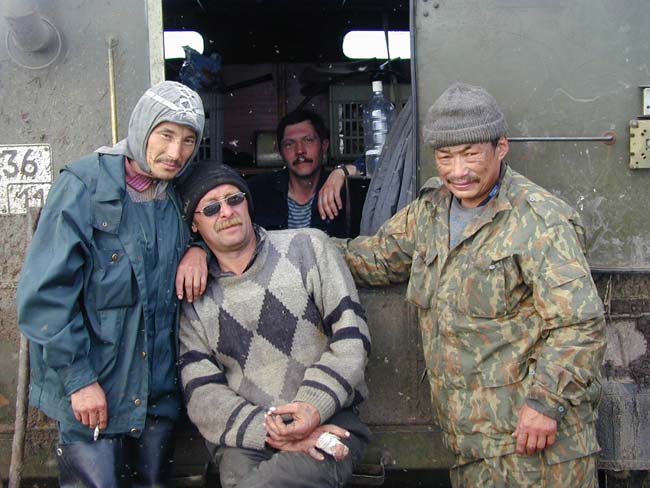Making a Living Studying Nature

Get the world’s most fascinating discoveries delivered straight to your inbox.
You are now subscribed
Your newsletter sign-up was successful
Want to add more newsletters?
Join the club
Get full access to premium articles, exclusive features and a growing list of member rewards.
Editor's Note: ScienceLives is an occasional series that puts scientists under the microscope to find out what makes them tick. The series is a cooperation between the National Science Foundation and LiveScience.
Name: Peter A. Siver Age: 54 Institution: Connecticut College Field of Study: Aquatic Science, Phycology
Connecticut College botanist Peter Siver has taken his study of some of the world’s tiniest organisms from the pure science of discovering new life to the applied realm of helping solve crimes. In a recent Behind the Scenes feature, Crimes to Climate History: Tiny Diatoms Offer Big Clues, Julie Wernau of Connecticut College reveals what it’s like to find thousands of organisms in the tiniest samples of earth. Below, Siver follows up with the ScienceLives 10 questions.
What inspired you to choose this field of study? Growing up in a rural community in the Berkshire Mountains of western Massachusetts, my family, friends and I spent significantly more time outdoors than kids play computer games today. I enjoyed exploring the surrounding woods, capturing insects in the local fields and especially probing local rivers and lakes. I simply loved the water. I was in sixth grade when an older brother of a close friend, someone that I knew and admired, was accepted to college and soon thereafter was studying birds of prey. Not many kids from this community went to college, and, for me, this opened a whole new world of possibilities. For the first time I realized people could make a living studying nature. I never thought of doing anything else after that.
What is the best piece of advice you ever received? Recently, I read a story about one of my former students who commented on a piece of advice I had once given to him. It made me think of my father who was indeed my mentor and best friend for many years. My parents instilled what I would call a "body of advice" that would include the following: be independent when the situation demands it, depend on others when you need to, follow your instincts when you do not know the answer, take responsibility when you are wrong and learn from your mistakes.
What was your first scientific experiment as a child? Well, I am not sure that I remember what my first experiment was, but one that sticks in my mind was when a friend and I tried to lure a specific type of moth using a special aromatic concoction we had read about in a book from the library. We set up two lights about 200 feet apart. Next to one we placed a bottle of this stuff we had mixed precisely as noted in the book. It smelled absolutely horrible. We waited with great anticipation for the evening and turned on the lights. An hour passed, and we went to find our moth. The light without the concoction had literally hundreds of moths and other night visitors as usual, while the smelly light attracted hardly any insects and certainly not our prize moth. I guess we concluded that the stuff smelled horrible to the moths as well!
What is your favorite thing about being a scientist or researcher? For me it is the excitement of discovery. Regardless of how large or small your findings are, they are all thrilling experiences. I have also thoroughly enjoyed meeting, working with and most of all getting to know numerous scientists from around the world.
Get the world’s most fascinating discoveries delivered straight to your inbox.
What is the most important characteristic a scientist must demonstrate in order to be an effective scientist? Be curious, take a chance on that hunch, keep abreast of other fields and learn to effectively communicate your findings.
What are the societal benefits of your research? Over the years my research group has helped scientists and environmental managers understand the effects of human-related stresses such as nutrient pollution, acidic deposition and salt contamination on freshwater ecosystems. Our work has aided in identifying how land-use alterations in surrounding watersheds affect water quality. We have also been actively involved in providing biotic inventories of two important microscopic groups of organisms, the chrysophytes and diatoms, for the region stretching from Florida to Newfoundland, including the discovery of about 50 new organisms. More recently, our explorations of ancient lakes that existed near the Arctic Circle during an incredibly warm period in the Eocene has provided insights that will be useful in understanding future global warming. Lastly, we maintain a substantial web site that aids in the education of our nation's youth.
Who has had the most influence on your thinking as a researcher? Wow, this is not at all an easy question to answer. For me, I think the answer embraces a group of scientists and mentors who were all brilliant thinkers, but each had unique and different abilities. George Schumacher and Patricia Bonamo from SUNY-Binghamton were so enthusiastic about the organisms they admired and studied and were simply wonderful teachers; Chuck Reif, Wilkes College, was so curious about science and despite having been a faculty member for almost 40 years before I met him still seemed like a young excited kid when investigating his favorite lake in the Pocono Mountains. Al Baker from the University of New Hampshire had such a passion, drive and pure ability to solve problems. Peter Rich, on the faculty of the University of Connecticut was broadly trained and readily able to integrate biology, physics and chemistry into his work examining energy flow in aquatic ecosystems. Art Mathieson, a marine phycologist from the University of New Hampshire, helped me realize what it would take to write my findings in order to get them published. Lastly, Francis Trainor and William Niering, long time faculty at the University of Connecticut and Connecticut College, respectively, both embraced many of these qualities and were wonderful role models. I would like to think that there is a little of each of these scientists within me.
What about your field or being a scientist do you think would surprise people the most? The fact that scientists represent a true cross section of society — some love sports, others politics; some enjoy a fine wine and others a local brew; some play rock and roll, others jazz; some love to work with wood and others electronics; some are history buffs and others crave science fiction; some drive crazy and some prefer to walk; outside of the lab, most are simply regular people!
If you could only rescue one thing from your burning office or lab, what would it be? Assuming I was alone, I guess I would rescue myself and an external hard drive, in that order, and be sure to snatch a few pictures of my kids on the way out.
What music do you play most often in your lab or car? This is an easy question - rock and roll from the 60s and early 70s, of course. Is there any other kind of real music?
 Live Science Plus
Live Science Plus










